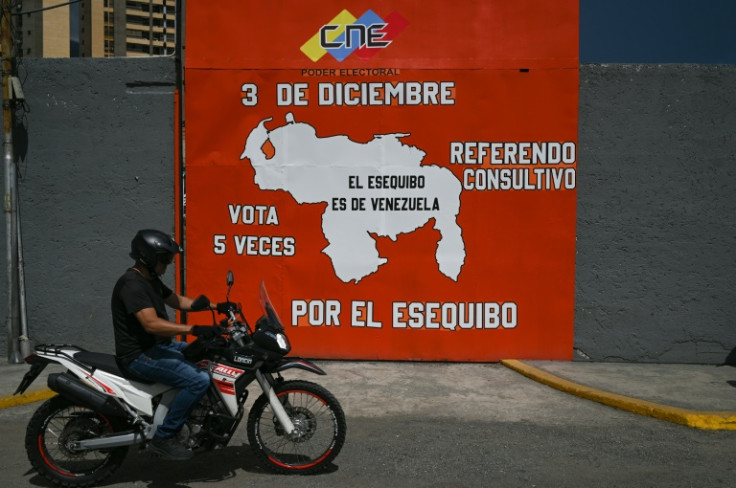
Venezuela said Friday it would press ahead with a weekend referendum over the fate of an oil-rich region claimed by itself and Guyana even as the UN's top court urged restraint in the worsening row.
Meanwhile regional giant Brazil, with which both neighbors share a border, said it had "intensified" its military presence amid "concern" in Brasilia over the standoff.
In The Hague, the International Court of Justice (ICJ) ordered Venezuela to "refrain from taking any action which would modify the situation that currently prevails" in the Essequibo region, which Guyana has administered for over 100 years.
The judges decided in an urgent bid by Georgetown to stop Sunday's vote, but did not mention the plebiscite in their ruling.
Instead, the court ordered both parties to "refrain from any action which might aggravate or extend the dispute before the court or make it more difficult to resolve."
Venezuela claimed victory.
"Nothing in international law allowed the court to interfere in the internal affairs of Venezuela, nor to seek to prohibit or modify a sovereign act," said Vice President Delcy Rodriguez, reading from an official document at a press conference.
"Venezuela, as it had announced... will continue with all preparations to carry out the consultative referendum," added Rodriguez, accompanied by the ministers of defense and foreign affairs.
Venezuela has for decades laid claim to Essequibo, which makes up more than two-thirds of the territory of Guyana and is home to 125,000 of its 800,000 citizens.
Litigation is pending before the ICJ over where the borders should lie.
Guyana, a former British and Dutch colony, insists the borders were determined by an arbitration panel in 1899.
But Venezuela claims the Essequibo River to the region's east forms a natural frontier and had historically been recognized as such.
The dispute has intensified since ExxonMobil discovered oil in Essequibo in 2015.
Caracas called the referendum after Georgetown started auctioning off oil blocks in Essequibo in August.
Sunday's referendum will ask citizens whether or not Venezuela should reject the 1899 arbitration decision as well as the ICJ's jurisdiction in the matter.
They will also be asked whether or not Venezuelan citizenship should be granted to the people -- currently Guyanese -- of a new "Guyana Esequiba State."
Guyana says the referendum poses an "existential" threat to the country as it could pave the way for Venezuela to "unilaterally and illegally" seize the region.
It insists the vote is a violation of international law, and has received backing from the Caribbean Community (Caricom) and the Organization of American States (OAS).
The ICJ said in its ruling there was a "serious risk of Venezuela acquiring and exercising control and administration of the territory in dispute in the present case."
Tiny Guyana has the world's biggest reserves of crude per capita, while economically ailing Venezuela, facing crippling international sanctions, sits on the largest proven reserves overall.
Just last month, Guyana announced a "significant" new oil discovery in Essequibo, adding to estimated reserves of at least 10 billion barrels -- more than Kuwait or the United Arab Emirates.
Paul Reichler, a lawyer representing Guyana, told the court during hearings in November that Venezuelan "military preparations were already underway" to enforce the referendum result.
In her submission to the court, Rodriguez insisted a recent military mobilization was to prepare for the referendum.
The ICJ rules on disputes between states but while its decisions are legally binding, it has no power to enforce them.
Brazilian defense ministry said Friday it "has been following the situation."
In a statement sent to AFP, it said "defense operations have been intensified in the country's northern border region, leading to a larger military presence."
Brazil's top diplomat for Latin American affairs, Gisela Maria Figueiredo, said Thursday President Luiz Inacio Lula da Silva's administration was following the situation with "concern."
In the United States, which has close relations with Guyana, National Security Council spokesman John Kirby appealed for a peaceful resolution to the dispute.
"The 1899 arbitral award that determined the land boundary between Guyana and Venezuela should be respected unless the parties reach a new agreement or the International Court of Justice decides otherwise," he said.







